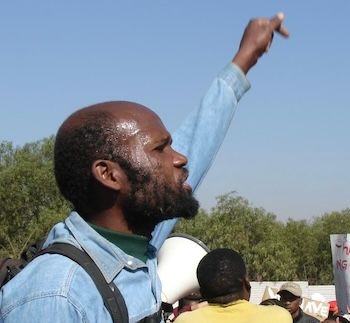Philip Nyalungu

Summary: Philip Nyalungu, a grassroots community activist and journalist, fights austerity, unfair labor practices, corporal punishment, intolerance, and gender-based violence in South Africa. As a result, he has faced resistance and threats from dominant political parties, and his programs have often been infiltrated and hijacked by politicians. Nyalungu suffered arrests for criticising authorities for failing to fulfill their electoral promise, and others feared he could be killed for challenging authority. Despite the hurdles, Nyalungu maintains that he will never surrender.
Profile: Born in 1973, in the village of Chavani, Limpopo, to a xiTsonga-speaking, black, working-class family, Philip Nyalungu started his activism when he was very young: In standard 6, he organized a church in his grandmother’s house. When his passion could not be met, he left the church and went to Johannesburg, where he worked as a car guard and construction worker.
Whilst in Johannesburg, Nyalungu was introduced to socialism; its ideas of equality, justice, and fairness appealed to him: “Socialist ideas made sense to me as they provided an alternative to the hegemonic view, a different way of understanding the world, and fighting for real freedom. I met other young black and white activists who radicalised me. I started to organise at my school in the village and traveled to Johannesburg for meetings.”
In 1994, Nyalungu returned to Limpopo, determined to complete his studies, now equipped with counter-hegemonic ideas and strategies to challenge the status quo. He organised teachers, students, and HIV/AIDS patients to fight injustice in their respective communities: “I organised fellow students. I’d put pressure on the school management to stop corporal punishment. I fought against HIV/AIDS stigmatisation, stood for gay rights and for women rights. I also supported schoolteachers’ unions.”
Nyalungu’s campaigns bore fruit, e.g., when the South African constitution criminalised corporal punishment. However, because of his work, Nyalungu was labeled a troublemaker and left school for Johannesburg before sitting for his matric examination.
When Nyalungu arrived in the Motsoaledi informal settlement in the late 1990s, “People were waiting for the government to provide proper water, electricity, and housing, and they were getting fed up. Many were unemployed or had casual jobs.” Nyalungu started a community structure and projects in Elias Motsoaledi, Soweto. “Here we challenged the ANC neoliberal policies head-on,” says Nyalungu. “We put pressure on the government to install electricity and sewage infrastructure and to build houses.”
On 15 January 2005 Nyalungu launched a mass-based community structure, Motsoaledi Concerned Residents (MCR), to call leaders to account and challenge austerity. He recalls: “I also started a community newspaper called Motsoaledi News, or Vuka Motsoaledi, which means ‘Wake up, Motsoaledi!’, which was distributed for free. We used the paper to organise meetings and make announcements, but the focus was on linking lived experiences and daily life to the bigger political questions. For example, we articulated a critique of capitalism and linked it to the horrible conditions in which we lived as the black working class, and we argued that real change needed much more than voting or choosing bosses.”
On 16 June 2005, the MCR had its first protest demanding better services. “During the protest,” says Nyalungu, “I carried an ANC poster with Thabo Mbeki, former South African President after Nelson Mandela. It had a big question mark on it sending the message that, ‘We voted, but you are forgetting us. Why?’” A month later, Nyalungu and his colleagues organised another protest to challenge empty promises and deteriorating service delivery in Motsoaledi.
To educate his community about the value of food sovereignty, literacy, and organising, Nyalungu started the Pambili Motsoaledi Community Project, a community center that housed a garden, library, and meeting place. He later organised waste pickers under the Mass Solidarity Movement/Makhanda Waste Pickers Movement (MSM/MWPM).
In 2022, Nyalungu co-founded the Ntirhisano Community Centre (NCC), a radical and progressive community center based on mutual aid principles to challenge the rampant capitalist hegemony and its existing state of affairs. “Our aim,” says Nyalungu, “is to reclaim our lives together with vulnerable communities. We embrace and celebrate resilient-resistance socioecological and economic cultures and traditions. That kept humans, communities, and nature connected.” The center has English learning, students, and open-mic poetry events; it offers free Wi-Fi for the community.
Nyalungu has been lucky to survive because of his activism: “More than one person had told me I was very lucky to have arrived at the Motsoaledi squatter camp in 2001, since the MK group would not have tolerated any questioning of the ruling party,’’ said Nyalungu. In 2002 he was among the Soweto Electricity Crisis Committee (SECC) and Anti-Privatisation Forum (APF) members arrested for protesting against neoliberal policies of the mayor of Johannesburg. When Nyalungu formed the Black Action Group and organised mass meetings to make community members aware of the root cause of their problem, the African National Congress disrupted these gatherings.
“They would hold their own meeting in the field,” remembers Nyalungu, “just before ours could begin, to block us, or infiltrate our mass meetings, and hijack us, or arrive on the scene, using a loudhailer to disrupt us. But the people’s positive support strengthened my resolve.”
There was more, though, for example, when he was forming a community-based organisation in Phesheya: “ . . . hooligans loitered nearby, glaring at us. Then they came over and tore up our papers, saying, ‘Asifuni abovukengceni,’ meaning ‘Away, political groups that come from nowhere.’ I went into hiding in Johannesburg. It was so frightening.”
Even though Nyalungu has gout complications that make walking long distances difficult and make him limp most of the time, he continues to organise and participate in solidarity actions.
“I will never surrender,” he affirms. “We have to continuously defend revolutionary victories, whilst we keep on demanding, fighting, and restoring our freedom, dignity, and human rights for all.”
